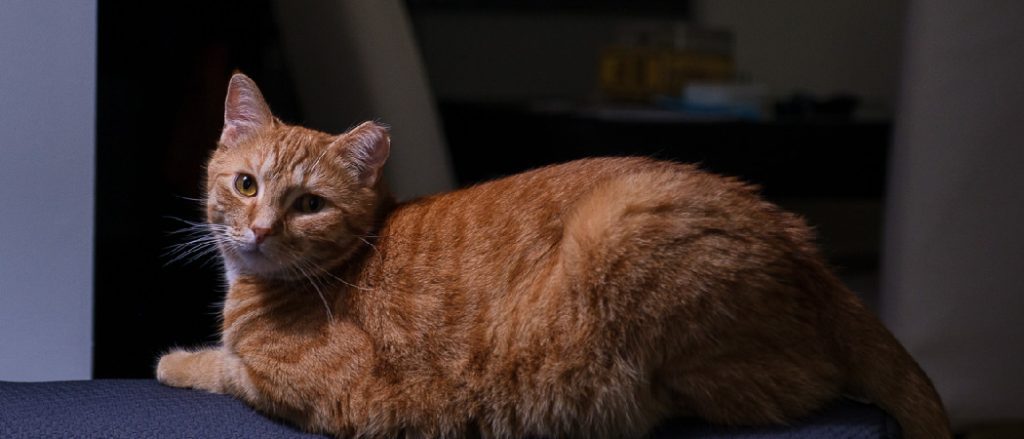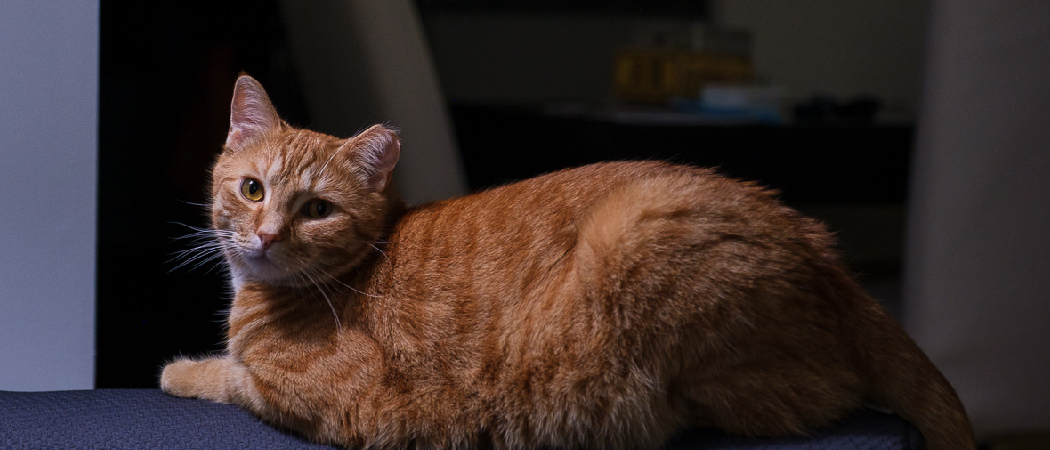At night, cats may become suddenly affectionate due to their natural instinct for nighttime activity and attention-seeking behavior, seeking companionship and playtime from their owners, while also exhibiting their independent nature during the quieter hours of the day. Cats are known for their independent and aloof nature, often choosing when and how they show affection.

However, many cat owners may have experienced a sudden change in their feline friend’s behavior, becoming unexpectedly affectionate during the night. Understanding the reasons behind this nocturnal shift can help cat owners better appreciate and meet their furry companion’s needs.
This article explores the various factors that can contribute to a cat’s sudden nighttime affection, including their natural instincts, attention-seeking behavior, and independent nature. By gaining insight into these reasons, cat owners can nurture a stronger bond with their feline friends and create a more harmonious relationship during both day and night.

Credit: www.reddit.com
Understanding Feline Behavior
Understanding feline behavior is key to ensuring that our beloved cats receive the care and attention they need. As responsible pet owners, it is important for us to pay attention to any changes in our cat’s behavior, including why they may suddenly become more affectionate at night. In this article, we will explore the reasons behind this behavior and provide insights into the factors that may be influencing our feline friends.
Cats are crepuscular animals, which means they are most active during dawn and dusk. This natural behavior stems from their ancestors who were predominately nocturnal hunters. By being active during these low light periods, cats can have a better chance of catching their prey. While domestication has led to some adjustments in sleep patterns, many cats still retain these inherent nocturnal tendencies.
During the night, when the house is quiet and the lights are dim, cats may feel more secure and comfortable exploring their surroundings. The absence of daytime distractions and the relaxation of their human companions create an environment that encourages their nocturnal instincts to kick in. Consequently, you may notice your cat becoming more playful, energetic, and affectionate during these hours.
Several factors can influence and contribute to your cat’s sudden affectionate behavior at night. These factors are not limited to but may include:
- Environmental Stimuli: Cats are highly attuned to their environment and can be sensitive to changes in their surroundings. For example, the absence of daytime noises and activities can make them feel more secure, which in turn can increase their affectionate behavior at night.
- Temperature and Comfort: Cats are naturally drawn to warm and cozy spaces. As the temperature drops at night, they may seek out the warmth of our beds and cuddle up with us for comfort.
- Establishing Territory: Cats are territorial animals, and their affectionate behavior at night may be a way of marking their territory and expressing their bond with you. By being close to you and rubbing against you, they are leaving their scent and claiming you as part of their territory.
- Social Bonding: Cats are social beings and form strong bonds with their human companions. The quietness of the night provides an ideal opportunity for them to seek your attention, interaction, and affection without any distractions.
By understanding these factors and appreciating the role of nocturnal behavior, we can better care for our cats and foster a stronger bond with them. Remember, every cat is unique, and their sudden affectionate behavior at night may have specific triggers that relate to their individual personalities and experiences. Paying attention to these behaviors can build a deeper connection with your feline companion and help provide them with the love and care they need.

Credit: www.reddit.com
Cats’ Natural Nocturnal Behavior
Have you noticed that your cat becomes more affectionate at night? Well, you’re not alone. Many cat owners have observed this change in behavior, and it can leave you wondering why your feline friend suddenly craves attention when the sun goes down. The answer lies in cats’ natural nocturnal behavior, which is deeply rooted in their biology and evolutionary history. Understanding the factors that contribute to their nighttime affection can give us a fascinating insight into our furry friends’ behavior.
Cats’ Circadian Rhythm
One of the main reasons why cats display increased affection at night is their unique circadian rhythm. Unlike humans, who are diurnal, cats are crepuscular animals—meaning they are most active during dawn and dusk. Throughout history, cats have evolved to hunt and explore during these low-light periods. While they may take naps during the day, their internal clocks are designed to be most active when the darkness falls.
Hunting Instincts
Another significant factor to consider is their hunting instincts. Even though our domesticated feline friends don’t need to rely on hunting for survival, their prey drive remains intact. Cats are natural hunters and possess highly developed senses, allowing them to thrive in low-light conditions. When your cat becomes affectionate at night, it could be their way of seeking companionship and expressing their hunting instincts. By bonding with you and receiving attention, they satisfy their need for social interaction and stimulation.
Implications For Evening Affection
The implications of cats’ nocturnal behavior extend beyond simply craving attention at night. These evening affection sessions can be influenced by several factors. Firstly, cats are known to be sensitive to changes in their environment. The quiet, calm atmosphere during nighttime may make them feel more secure and relaxed, prompting them to seek out affection and closeness. Additionally, the lack of distractions at night allows cats to focus solely on their human companion, increasing the quality of bonding time you share. Lastly, the reduced human activity during evening hours can provide cats with a sense of independence and autonomy, making them more open to initiating affectionate behavior.
All of these combined factors contribute to your cat’s sudden surge of affection during the night. Embracing and understanding these natural instincts will not only deepen the bond you have with your feline companion but also ensure you provide an environment where they can thrive and express their true nature.
Factors Affecting Cats’ Affectionate Behavior At Night
Cat owners may find it intriguing and even delightful when their feline companions suddenly become more affectionate during the nighttime. While the reasons for this change in behavior may vary from cat to cat, several factors can influence why your cat becomes more loving in the evenings. Understanding these factors can give you insights into your cat’s behavior and help foster a stronger bond with your beloved pet.
Environment And Routine Changes
The environment and routine can have a significant impact on your cat’s behavior, including their level of nighttime affection. Cats thrive on consistency and can become stressed or anxious when their surroundings or daily routine undergo any alterations. When you notice your cat becoming more affectionate at night, consider whether any recent changes have occurred in their environment.
If you recently rearranged furniture, brought in new household members, or even changed the location of their litter box or food bowls, your cat may be seeking extra comfort and reassurance during the nighttime. Cats are creatures of habit and may turn to affectionate behavior as a way to seek comfort and security during these uncertain times.
Temperature And Comfort
Just like humans, cats also seek comfort when it comes to sleep. The temperature of your home might be a factor contributing to your cat’s sudden affectionate behavior. Cats have a higher body temperature than humans, ranging from 100.4°F to 102.5°F. If the ambient temperature is too warm, your cat may have difficulty regulating their body temperature, leading to increased activity and seeking affection during the cooler nighttime hours.
Ensure your cat has access to cool, comfortable spots to rest, away from direct sources of heat or drafts. Providing your cat with a cozy bed or a designated spot with soft bedding can offer them the comfort they desire, lessening their need for nighttime affection.
Attention And Interaction
Cats are known for being independent creatures, but they also crave attention and interaction from their human companions. If your cat suddenly becomes more affectionate at night, it may be their way of seeking more quality time with you. Cats are crepuscular animals, meaning they are most active during the twilight hours of dawn and dusk.
During the day, you may be occupied with work or daily chores, leaving your cat seeking attention throughout the evening and early morning. When your cat displays affectionate behavior at night, it is their way of expressing the desire for play and interaction with you. Responding positively to their affectionate gestures and engaging in interactive play sessions can help fulfill their need for attention and strengthen the bond between both of you.

Credit: www.amazon.com
Frequently Asked Questions Of Why Is My Cat Suddenly Affectionate At Night
Why Is My Cat Suddenly Affectionate At Night?
Cats may become more affectionate at night due to their natural hunting instincts. They are more active during the night and may seek attention and playfulness. Providing interactive toys and engaging with your cat during daytime can help redirect their energy, making them less in need of attention at night.
Is It Normal For A Cat To Be More Affectionate At Night?
Yes, it is normal for cats to be more affectionate at night. Cats are crepuscular animals, which means they are most active during twilight hours. They may display increased affection, seeking attention, and being more playful during this time. It is important to provide outlets for their energy during the day to prevent excessive nighttime behavior.
How Can I Encourage My Cat To Be Affectionate During The Day?
To encourage your cat to be more affectionate during the day, engage in interactive play sessions with them. Use toys that mimic hunting, such as feather wands or laser pointers, to keep them active and stimulated. Offer treats and praise during playtime to reinforce positive behavior.
Providing a consistent routine and plenty of mental and physical stimulation can help shift their affectionate behavior to daytime.
Conclusion
To sum it up, if you find your cat suddenly becoming more affectionate at night, there could be a few reasons behind this behavior. It’s important to consider factors such as their natural nocturnal instinct, the temperature, changes in routine, and even health issues.
By studying your cat’s behavior patterns and providing them with a comfortable environment, you can better understand their nighttime affection and ensure their well-being. So, embrace those midnight cuddles with your feline friend and enjoy the special bond you share!


